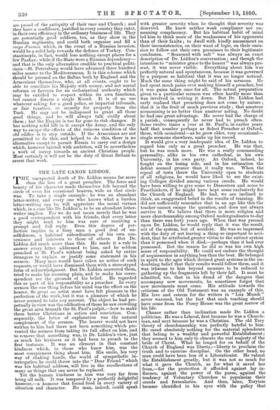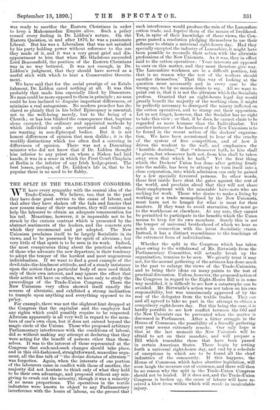THE LATE CANON LIDDON. T HE unexpected death of Dr. Liddon
means far more than the loss of a great preacher. The force and beauty of his character made themselves felt beyond the circle of even his occasional hearers, wide as that circle was. To take a single example : he was an abundant letter-writer, and every one who knows what a burden letter-writing can be, will appreciate the moral virtues which, in a case like Dr. Liddon's, to be an abundant letter- writer implies. For we do not mean merely that he was a good correspondent with his friends, that every letter they might send to him was sure of receiving a prompt and full reply. Even this degree of per- fection implies in a busy man a good deal of un- selfishness, a habitual subordination of his own con- venience and interests to those of others. But Dr. Liddon did much more than this. He made it a rule to answer every letter addressed to him, and he seldom preached at St. Paul's without being asked by entire strangers to explain or justify some statement in his sermon. Many men would have taken no notice of such requests, or would have dismissed them with a stereotyped form of acknowledgment. But Dr. Liddon answered them, tried to make his meaning plain, and to make his corre- spondent see the grounds of his belief. He regarded this as part of his responsibility as a preacher. In every sermon the one thing before his mind was the effect on the hearer. So great an artist must have felt pleasure in the perfection of the work, but it was a pleasure of which he never seemed to take any account. The object he had per- petually in view was the edification of those he saw crowding the great area beneath the St. Paul's pulpit,—how to make them better Christians in action and conviction. Con- sequently, the letter of explanation was the natural complement of the sermon. The hearer would not have written to him had there not been something which pre- vented the sermon from taking its full effect on him, and to remove that something was, in Dr. Liddon's view, just as much his business as it had been to preach in the first instance. It was an element in that constant kindness which, to those who knew him, was the most conspicuous thing about him. His smile, his very way of shaking hands, the world of sympathetic in- terrogation he could throw into the " Dear Friend " which was his habitual address, will live in the recollections of many as things that can never be replaced. Yet the human kindness in him was very far from being all milk. It was tempered by a perfectly delightful humour,—a humour that found food in every variety of situation and character. No man, indeed, could speak with greater severity when he thought that severity was deserved. He knew neither weak compliance nor un- meaning complacency. But his habitual habit of mind led him to think more of the weaknesses of his opponents than of their faults ; to dwell with kindly amusement on their inconsistencies, on their want of logic, on their omis- sion to follow out their own premisses to their legitimate conclusion. " Seasoned with salt " was always an exact description .of Dr. Liddon's conversation ; and though the intention to " minister grace to the hearer " was always pre- sent, it was never visible. Everything about him was perfectly natural and spontaneous, because it was governed by a purpose so habitual that it was no longer noticed. Much the same thing might be said of his sermons. He had spent much pains over making himself a, preacher, but it was pains taken once for all. The actual preparation given to a particular sermon was often hardly more than was involved in writing it down. But Dr. Liddon had early realised that preaching does not come by nature ; that it is the fruit of much previous study ; that amateur sermonising is no better than amateur acting. No doubt he had one great advantage. He never had the charge of a parish ; consequently he never had to preach often. Some twelve times a year at St. Paul's, in earlier years half that number perhaps as Select Preacher at Oxford, these, with occasional—as he grew older, very occasional— single sermons elsewhere, make up his record. It would give a very inadequate idea of Dr. Liddon to regard him only as a great preacher. He was that, but he was much more. He was a really commanding personality, alike in his own cathedral, in his own University, in his own party. At Oxford, indeed, he fought on the losing side, and in his estimation the defeat seemed greater than it really was. When the repeal of tests threw the University open to students of all religions, he would have liked to see the exist- ing Colleges divided among various creeds. He would have been willing to give some to Dissenters and some to Freethinkers, if he might have kept some exclusively for the Church of England. He had, we are inclined to think, an exaggerated belief in the results of training. He did not sufficiently remember that in an age like this the teacher cannot escape the question, and does not always survive it. We believe that there is more religion and more churchmanship among Oxford undergraduates to-day than there was forty years ago. When that was pressed upon Dr. Liddon, he would reply that it was the result. not of the system, but of accident. He was so impressed with the duty of not leaving a thing so important to acci- dent, that he attributed greater virtue to the extinct system than it possessed when it died,—perhaps than it had ever possessed. But the reason he did so was his own high sense of responsibility. He could not endure the thought of acquiescence in anything less than the best. He belonged in spirit to the ages which devised great systems in the un- doubting belief that their results would follow them, and it was irksome to him beyond measure to be reduced to gathering up the fragments left by their fall. It must be admitted, too, that in his dread of the dangers that accompany new movements, he sometimes forgot that new movements must come. His attitude towards the criticism of the Old Testament was an example of this. His love and esteem for the writers in " Lux Mtmdi " never wavered, but the fact that such teaching should have come from the Pusey House was the great sorrow of his life.
Chance rather than inclination made Dr. Liddon a politician. He was a Liberal, first because he was a Church- man, and next because he was a Christian. The old Tory theory of churchmanship was perfectly hateful to him. He cared absolutely nothing for the material splendours that belong to a wealthy and powerful Establishment; they seemed to him only to obscure the real majesty of the bride of Christ. • What he longed for on behalf of the Church of England was liberty,—liberty to proclaim• the truth and to exercise discipline. On the other hand, no man could have been less of a Liberationist. He valued the Establishment greatly, but it was not so much for what it gave the Church, as for what it saved her from,—for the protection it afforded against lay in- fluence, against the power of the purse, against the tendency of Voluntary Churches to popularise their creeds and formularies. And then, later, Toryism became identified in his eyes with the policy that was ready to sacrifice the Eastern Christians in order to keep a Mahommedan Empire alive. Such a policy roused every feeling in Dr. Liddon's nature. On the Eastern Question, in and after 1876, he was a passionate Liberal. But his was a Liberalism that was not satisfied by his party holding power without reference to the use they made of it, and it was a very great grief and dis- appointment to him that when Mr. Gladstone succeeded Lord Beaconsfield, the position of the Eastern Christians was in no way bettered. It was not enough, in Dr. Liddon's judgment, that they should have served as a useful stick with which to beat a Conservative Govern- ment.
We have said that for the social prestige of an Estab- lishment, Dr. Liddon cared nothing at all. It was this probably that made him especially liked by Dissenters. No man could be more opposed to them in principle ; no man could be less inclined to disguise important differences, or minimise a real antagonism. No modern preacher has de- clared so plainly that in his belief Episcopacy is essential, not to the well-being merely, but to the being of a Church ; or has less blinked the consequence that, baptism alone excepted, the ordinary and appointed methods by which individual souls are nurtured and built up, are wanting in non-Episcopal bodies. But it is not honest differences of opinion that men dislike ; it is the worldly distinctions which too often find a covering in differences of opinion. There was not a Dissenting minister who did not know that if Dr. Liddon thought him inferior to any priest on whom a Bishop had laid hands, it was in a sense in which the First Court Chaplain at Berlin is the inferior of any Irish hedge-priest, The best lesson, perhaps, of Dr. Liddon's life is, that to be popular there is no need to be flabby.







































 Previous page
Previous page